Red and Green. Films reviewed: Wild Mountain Thyme, Sing Me a Song
Hi, this is Danel Garber at the movies for culturalmining.com and CIUT 89.5 FM.
This year – with it’s school-closings, rampant unemployment and a province-wide lockdown – surely won’t be remembered as a great Christmas. Especially not for movies. I can barely remember the last movie I saw in a theatre. But on the bright side, this means there’s lots more time watch them, at least at home.
This week, I’m talking about two new movies, a documentary and a comedy romance, that reflect the seasonal colours of red and green. There’s a lovesick Buddhist monk draped in maroon robes, and rural courtship on the emerald isle.
 Wild Mountain Thyme
Wild Mountain Thyme
Wri/Dir: John Patrick Shanley
Once upon a time in county Mayo, Ireland, there were two farms. They belong to two families, the Muldoons and the Rileys, and the Rileys, to get in and out of their own farm must cross a strip of land belonging to the Muldoons, with an iron gate on it. So the two families are forever tied. Rosemary Muldoon (Emily Blunt) is a strong willed girl who loves riding horses. She is tall and elegant with long ginger hair and will dance a jig whenever shes happy. . Her father tells her you can do anything you want, you’re like the swan in the ballet Swan Lake. But where’s her handsome prince?
Across the hill lives Anthony Reilly (James Dornan). He’s clumsy, tongue-tied and shy. He likes smelling the wild flowers but gets nervous around girls. . He’s secretly in love with Rosemary but is too shy to tell her. Falsh forward a few decades, and nothing has changed. Anthony practices proposing to Rosemary  by talking to a donkey, thus reinforcing the local lore that he’s more like a Kelly than a Riley, meaning hes stupid and prone to madness.
by talking to a donkey, thus reinforcing the local lore that he’s more like a Kelly than a Riley, meaning hes stupid and prone to madness.
Finally, his father (Christopher Walken) has had enough. He invites his nephew Adam (John Hamm), a stock trader from Manhattan who drives a Rolls Royce, to come and see the farm… and their still-unmarried neighbour Rosemary. Is this her prince come to rescue her? Or should she keep waiting for Anthony to propose.
Wild Mountain Thyme is a comedy romance that just doesnt work. Its set — I imagine – in the 1990s or 2000s but seems frozen in time. No music except Swan Lake on a phonograph and celtic singalongs at the local pub. as if the radio and TV have yet to be invented and the 50s, 60s, 70s and 80… never happened. Would a headstrong woman really wait decades for a man who lives next door to propose? This was originally a Broadway play that won a Tony, but it  clearly doesn’t translate well to the screen. The make up is weird, but so are the fake Irish accents and ridiculous plot. Even the art direction is awful — bright red shutters on a white-washed house, artificial looking CGI. Everything looks false and contrived. Emily Blunt is a good actress, but what the hell is this? Shanley wrote and directed the very good Doubt, and Dornan made his fame as a “sexual” movie star with the 50 Shades of Grey series, but this movie is a weirdly nostalgic American simulacrum of an Ireland that never existed. This movie is not entirely without merit; there is one good part – when Anthony reveals his totally unexpected secret fantasy (no spoiler), but its not enough to save this dud.
clearly doesn’t translate well to the screen. The make up is weird, but so are the fake Irish accents and ridiculous plot. Even the art direction is awful — bright red shutters on a white-washed house, artificial looking CGI. Everything looks false and contrived. Emily Blunt is a good actress, but what the hell is this? Shanley wrote and directed the very good Doubt, and Dornan made his fame as a “sexual” movie star with the 50 Shades of Grey series, but this movie is a weirdly nostalgic American simulacrum of an Ireland that never existed. This movie is not entirely without merit; there is one good part – when Anthony reveals his totally unexpected secret fantasy (no spoiler), but its not enough to save this dud.
 Sing me a Song
Sing me a Song
Dir: Thomas Balmès
Laya is a town built around a buddhist monastery in the remote, mountainous kingdom of Bhutan. Peyangki is a teenager studying there to become a lama, or a buddhist priest. This means lighting oil lamps, and memorizing sutras and mantras with the other novices. He tries hard, but is not a great student. But he owes it to his single mom (his father was frightened to death by a bear the day he was born) to pray for her when she dies. He earns some extra money foraging for wild mushrooms with his sister. But while he’s training there, the country is electrifying (joining the power grid) for the first time. This means sattelite dishes, TV, cel phones and social networks. All entirely new conceots in Bhutan. Soon, the former novices are glued to their cels playing video games instead of meditating.
He meets a woman on Snapchat named Ugyen, when he asks her to sing him a love song. He thinks she’s pretty and nice and has a good voice. But what he doesn’t know is she’s a hostess who works at a karaoke bar in the capital. And that she’s divorced with a kid. And when they meet for the first time in person, both of them are very disappointed. Ugyen is the urban sophisticate, who is aware of the outside world and longs for the bounty money can buy. For Peyangki, even the capital is new to him, — he has no desire for money. But he soon adjusts to the thrills of arcades, fashions and virtual reality. Can this relationship work? Will Peyangki leave the monastery? And what about Ugyen’s goals and desires?
that she’s divorced with a kid. And when they meet for the first time in person, both of them are very disappointed. Ugyen is the urban sophisticate, who is aware of the outside world and longs for the bounty money can buy. For Peyangki, even the capital is new to him, — he has no desire for money. But he soon adjusts to the thrills of arcades, fashions and virtual reality. Can this relationship work? Will Peyangki leave the monastery? And what about Ugyen’s goals and desires?
Sing me a Song is a fascinating documentary about the modernization of Bhutan as seen through the eyes of the two main characters. Its told as a narrative, with the audience following both of the characters. So we know their secrets, but they don’t… that’s revealed on camera. The director Balmès — he made the wonderful movie Babies — has a way of enteringthelives of his  subjects. Its beautifully shot,often in darkness only lit by candlelight or the flashing glow of video screens. Some of the scenes seem planned or contrived, so you womder would this have happened the way it did without the camera there? And as a westerner — he’s a French film maker — is he also an influence on his subjects lives? — but you cant lie about the look and the faces and the feelings of the subjects. You really feel for them. This wonderful doc gives a rare inside look at the people in the remote kingdom of Bhutan.
subjects. Its beautifully shot,often in darkness only lit by candlelight or the flashing glow of video screens. Some of the scenes seem planned or contrived, so you womder would this have happened the way it did without the camera there? And as a westerner — he’s a French film maker — is he also an influence on his subjects lives? — but you cant lie about the look and the faces and the feelings of the subjects. You really feel for them. This wonderful doc gives a rare inside look at the people in the remote kingdom of Bhutan.
Wild Mountain Thyme is now playing and Sing Me a Song starts on January 1st across North America; check your local listings.
This is Daniel Garber at the Movies each Friday morning on CIUT 89.5 FM and on my website culturalmining.com.
Daniel Garber talks with director Susan Teskey and David Suzuki about Searching for Cleopatra on The Nature of Things
 Hi, this is Daniel Garber at the Movies for culturalmining.com and CIUT 89.5 FM.
Hi, this is Daniel Garber at the Movies for culturalmining.com and CIUT 89.5 FM.
You’ve probably heard of Cleopatra. She was a beautiful and sensual temptress who seduced two roman leaders before tragically killing herself in a fit of passion with an asp to her breast. Or… was she a brilliant leader, a skilled tactician, a multilingual scholar, and the most powerful woman of her era? What is the truth and what are the myths about this Ptolomaic  pharaoh and how can we tell the difference in our search for the real Cleopatra?
pharaoh and how can we tell the difference in our search for the real Cleopatra?
Searching for Cleopatra is a new documentary about this Egyptian titan. It talks to historians and scholars and captures recent archaeological finds that cast new light on her story. It’s directed by Susan Teskey, known for her work as a producer for The Fifth Estate. Searching for Cleopatra premiers on the Nature of Things on Jan 8, on CBC and CBC Gem. The Nature of Things is celebrating it’s 60th season, and has been hosted by noted environmentalist David Suzuki since 1979.
I spoke with Susan Teskey in Toronto, and David Suzuki in Vancouver via Zoom.
Off. Films reviewed: Save Yourselves!, Max Cloud, Another Round
Hi, this is Daniel Garber at the Movies for culturalmining.com and CIUT 89.5 FM.
This week I’m looking at three indie comedies about characters who find themselves in odd situations. There’s middle aged school teachers going off the wagon, a Brooklyn couple going off-grid, and a teenage girl going off this planet.
Wri/Dir: Alex Huston Fischer, Eleanor Wilson
Su and Jack (Sunita Mani, John Reynolds) are a Brooklyn couple in their early 30s. They love each other but something seems to be missing. It could be because they spend their lives glued to smart phones for texting, social networks and search engines. They can’t answer a simple question without googling it first. So when a friend at a wedding party offers them the use of his grandparents’ cottage in the woods, they decide it’s now or never. They cut the cords and take a week off-grid. That means no schedule, no email, no listicles, and no phone. Their lives will be authentic and spontaneous. So they pack their bags – along with ample arugula and kale – and drive up north, At the cottage they notice new things. Meteors falling from the sky. And have frank conversations. Jack tries to become more manly by chopping wood while Su resists pulling out her phone. It’s difficult but they can manage. Until things start to get strange. Loud bangs n the background. And an auburn pouffe — sort of a fluffy Ottoman – they find in the cottage. Why does it keep moving… by itself. Are they crazy? Or is 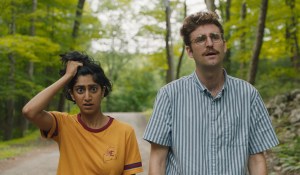 something going on.
something going on.
Turns out these adorable tribbles are actually dangerous aliens taking over the world. They devour all ethanol, and send out smelly waves disabling their enemies. Su and Jack don’t know any of this because they’re offline. But they also unknowingly fled chaos in the cities just in time. Can they survive this alien invasion? Or will they just be its latest casualty?
Save Yourselves is a cute, satirical comedy about ineffectual millennials trying to make it in a post-apocalyptic world. It’s funny, goofy and silly. Reynolds does Jack as an insecure dude in a moustache while Mani is an alienated Su who misses her mom. They’re a good comedy duo who play off each other well.
I like this low-budget comedy.
Dir: Martin Owen
It’s Brooklyn in 1990.
Sara is a teenaged girl who loves video games – she’s glued to her TV set 24/7. And it looks like she’s about to reach the top level of her space exploring game where Max Cloud and his sidekicks fight off the bad guys invading his spaceship. But her dad Tony is worried about her — she’s not doing her homework. So he grounds her and takes away the joy stick. But that’s not fair! Sara wishes she could play this game all the time… Little does she know, her wish is someone else’s command, and she is magically transferred into the game itself. Only they’re real people now, not 16-bit  game avatars.
game avatars.
There’s the hero, the devilishly-handsome chowderhead Max Cloud (Scott Adkins), the cynical Rexy (Sally Colett) and Jake, the wise-cracking young cook (Elliot James Langridge). And wouldn’t you know it, Sara takes the form of Jake not Max. They’ve crash-landed on the prison planet Heinous, and have to escape before the evil villains, Shee and Revengor, take over. Now it’s real life, not a game. How can Sara escape? Luckily her best friend, Cowboy (Franz Drameh) is in her bedroom holding the controls. If he can win the game, she can get back to the real world. But if not she’s trapped theer forever.
 Ok, when I started watching Max Cloud, it felt weird. The game characters spoke larger than life, the sets looked tacky and cheap, and the whole concept felt too over-the-top to be taken seriously. Why are they talking so strangely? Then it hit me.
Ok, when I started watching Max Cloud, it felt weird. The game characters spoke larger than life, the sets looked tacky and cheap, and the whole concept felt too over-the-top to be taken seriously. Why are they talking so strangely? Then it hit me.
They’re all British actors, playing cartoonish Americans, using a high camp sensibility. Like a low-budget episode of Peewee’s Playhouse invaded by characters from Mystery Science Theatre 3000. When looked at that way, it’s actually quite cute and funny. The plot is basically non-existant, but the characters are enjoyable, and I really loved the 16-bit style computer animation, especially when used on live human actors in a jerky, 90’s-style Street-fighter battle scene. Very cool.
If you’re into mullets and vintage games you’ll love Max Cloud.
Dir: Thomas Vinterberg
Martin (Mads Miklelsen) is a history teacher at a Copenhagen highschool who feels like something is missing from his life. He used to be funny, handsome and vibrant – he was a ballet dancer doing a PhD for God’s sake! But now, his home life is dull, his job even worse. His wife works nights – he rarely sees her. Somewhere along the way, his get up and go got up and went. Even his students are revolting over his unimpressive classes. What can he do?
One night at a birthday dinner with his three best friends – Tommy the gym coach (Thomas Bo Larsen), Nikolaj the psychology teacher (Magnus Millang) and
Peter who heads the school choir (Lars Ranthe) – propose a scientific experiment to change their lives.  Based on the writings of Norwegian psycholgist Finn Skårderud who says humans work best at an alcohol level of 0.05, they decide to maintain that level of drunkenness every day, except for nights and weekends. They carry personal breathalyzers to reach the exact level, and take careful notes of its effect. The initial results? Life is more fun, people laugh more, work seems easier, and their self-confidence is growing. It’s like wearing beer-goggles all the time. On the negative side there’s slurred speech, clumsiness and bad judgement. And when they raise the level to 0.1 things get really interesting. But other people are starting to notice with potentially terrible consequences. Have they taken their experiment too far?
Based on the writings of Norwegian psycholgist Finn Skårderud who says humans work best at an alcohol level of 0.05, they decide to maintain that level of drunkenness every day, except for nights and weekends. They carry personal breathalyzers to reach the exact level, and take careful notes of its effect. The initial results? Life is more fun, people laugh more, work seems easier, and their self-confidence is growing. It’s like wearing beer-goggles all the time. On the negative side there’s slurred speech, clumsiness and bad judgement. And when they raise the level to 0.1 things get really interesting. But other people are starting to notice with potentially terrible consequences. Have they taken their experiment too far?
Another Round is a very clever comedy about the good and bad points of alcohol. It’s all done tongue-in-cheek of course – Danish director Thomas Vinterberg loves poking at the bourgeoisie. Obviously, I’m not shouting three cheers for alcoholism, but after decades of Calvinistic Hollywood movies about the evils of hooch, reefer madness, and various other addictions, it’s refreshing to see something from the other side, taking the point of view of the guy with the lampshade on his head, rather than the finger-waving Mrs Grundys. Mads Mikkelsen is superb as a man whose life is reawakened by drinking, including an amazing dance sequence toward the end. This isn’t a light, easy movie – parts will definitely make you squirm – but Another Round is definitely something different, and something that you should see.
You can watch Save Yourselves beginning on Tuesday, while Another Round, and Max Cloud both open today digitally and VOD; check your local listings.
This is Daniel Garber at the Movies each Friday morning on CIUT 89.5 FM and on my website culturalmining.com.
Delivering the Message. Films reviewed: Songbird, Modern Persuasion, Swimming Out Till the Sea Turns Blue
Hi, this is Daniel Garber at the Movies for culturalmining.com and CIUT 89.5 FM.
This week I’m looking at three new movies – a rom-com, a thriller, and a documentary – about people delivering messages. We’ve got a romantic ad executive in Brooklyn, a courier in pandemic LA, and peasant-writers in northern China.
Dir: Adam Mason
It’s 2022, a year in the future, and Nico (K.J. Apa) is the happiest guy in LA. He’s a courier who spends his days zooming around the city’s almost-deserted streets on his motorbike delivering packages. You see, COVID-19 has wiped out almost everyone, and those still left alive are under permanent lockdown. Rich people cower behind high-security walls while in the poor parts of town, conditions are barbaric. Everyone is under constant surveillance, forced to submit daily digital “temp tests” to prove they’re not infected. Helicopters hover overhead looking for anyone disobeying the lockdown, enforced by “Sanitation Officers”, paramilitary thugs dressed in bright-yellow Hazmat suits.
So how come Nico gets to ride around unhindered? He wears a precious plastic bracelet proving he’s immune to the virus. The one sad note is he can’t get together with his girlfriend Sara (Sofia Carson). They’re forced to press hands on either side of closed doors and communicate only by texts. And he’s always on the look out for the evil head of the Sanitation Bureau (Peter Stormare) an immune serial killer who murders with impunity. Will  the virus ever end? And will Nico and Sara ever get to kiss?
the virus ever end? And will Nico and Sara ever get to kiss?
Songbird is a science-fiction romantic thriller about life under COVID. Apparently it is the first such movie conceived, shot and released during the pandemic. Aside from Sara and Nico (KJ Apa is the kiwi heart-throb from Riverdale, who regularly takes off his shirt to reveal his abs) the story also follows William and Piper Griffin (Bradley Whitford, Demi Moore) a crafty rich family who secretely keep their infected daughter Emma alive; a young woman who works as a youtube singer and part-time sex-worker; and some lonely and depressed war vets abandoned by their government but still ready to save the day. Songbird does an OK job at capturing the pandemic in cinematic form (up to now we’ve had to rely on old movies like Contagion, Outbreak, 28 Days) but it’s not great. And with our constantly-changing news cycle, how can any movie like this keep up with Covid-19?
Dir: Alex Appel, Jonathan Lisecki
Wren (Alicia Witt) is an advertising executive who lives in Brooklyn with her cat. She’s pretty and smart, but in her thirties and still single (gasp!). She broke up with her college sweetheart Owen when he moved to the Bay Area and made a fortune in tech. The agency – owned by brother-and-sister rich diletantes – is not doing well, so she has to land a new account soon. Luckilly, a social networking giant is interested in hiring them. It’s called “Blipper” (as in twitter… get it?) Luckilly she has two millennial assistants to help her navigate these strange waters. But when the potential client shows up, she’s shocked to see it’s Owen (Shane McRae), her lost love. And he treats her like she’s not even there, flirting with her younger assistants instead of her. It’s not like she doesn’t have suitors of her own. There’s Sam, Owen’s best friend, 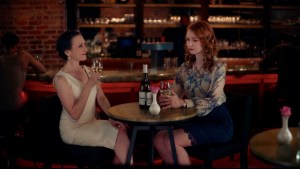 a middle-aged emo who listens to sad music from the 80s; and Tyler, a London hotshot who owns a rival ad agency. Her impromptu dates with Tyler are set up by her scheming aunt Vanessa (played by the great Bebe Neuwirth). But secretly, in her heart, she still pines for Owen. Does he still love her? Does she still love him? And which is more important – her career or her love life?
a middle-aged emo who listens to sad music from the 80s; and Tyler, a London hotshot who owns a rival ad agency. Her impromptu dates with Tyler are set up by her scheming aunt Vanessa (played by the great Bebe Neuwirth). But secretly, in her heart, she still pines for Owen. Does he still love her? Does she still love him? And which is more important – her career or her love life?
Modern Persuasion – as the title suggests – is a  contemporary take on the Jane Austen novel. Parties in the Hamptons replace balls in stately mansions, but the story seems essentially the same (I say “seems” because I haven’t read Persuasion, but I have seen a lot of Jane Austen movie knock-offs.) Beautiful women, especially Wren, dress in modern versions of romantic gowns, while the brooding / aloof / duplicitous men are all handsome, too. Appearance – clothes, hair, shoes, bags, looks – seems to be the great determiner in this movie. It’s cute and occasionally funny, but the plot is totally predictable, and some of the lines, especially the fake millennial-talk, are excruciating: Hashtag: Justshootme. That said, if you’re looking for some light, shallow and inconsequential entertainment, you could do worse than Modern Persuasion.
contemporary take on the Jane Austen novel. Parties in the Hamptons replace balls in stately mansions, but the story seems essentially the same (I say “seems” because I haven’t read Persuasion, but I have seen a lot of Jane Austen movie knock-offs.) Beautiful women, especially Wren, dress in modern versions of romantic gowns, while the brooding / aloof / duplicitous men are all handsome, too. Appearance – clothes, hair, shoes, bags, looks – seems to be the great determiner in this movie. It’s cute and occasionally funny, but the plot is totally predictable, and some of the lines, especially the fake millennial-talk, are excruciating: Hashtag: Justshootme. That said, if you’re looking for some light, shallow and inconsequential entertainment, you could do worse than Modern Persuasion.
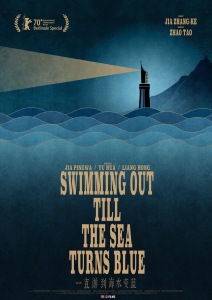 Swimming Out Till the Sea Turns Blue
Swimming Out Till the Sea Turns Blue
Dir: Jia Zhangke (past interviews here and here)
In 1942 under Mao Zedong, the Chinese Communist Party held talks in Yan’an on the role of writers and artists in a future Peoples’ Republic. They declared that literature should be written by educated peasants about their lives for other peasants to read. Fiction should serve the people and the Party, and foreign influences avoided. In Jia Zhangke’s new documentary, he looks at the effect this had on Chinese writers, by looking at four authors in chronological order: Ma Feng, Jia Pingwa, Yu Hua, and Liang Hong. The documentary interviews the writers themselves but also has random villagers reciting lines from the works directly toward the camera, in the style of Quotations from Chairman Mao Tse-tung.
Ma Feng was a writer in early Communist China. Born a peasant, he later became a writer lauded by the party. Locals in the model community Jia Family Village still talk about his innovations, like freedom to marry for love (rather than arranged marriages) and communal work teams that tackled major problems like making salty soil fit to grow crops. He was a fruit of the Yan’an Talks and studied at the Lu Xun Academy, where Western styles were frowned upon and a number of writers were purged. Ma Feng brought his  learnings back to his village.
learnings back to his village.
Jia Zhangke next looks at Jia Pingwa (no relation). His ambitions were thwarted in the 1960s because his dad once attended an opera in Xi’an registered through a local warlord (before liberation). Because of this record, he was declared a spy for the KMT, and his children were also labeled counter-revolutionaries. Jia Pingwa finally broke from his tainted background by painting 8-character slogans on a stone cliff beside a reservoir (he had good handwriting.) He’s now a noted writer.
Yu Hua is a popular novelist who used to be a dentist, a profession he hated. Although born in the beautiful city of Hangzhou, his family moved to a backwater, and lived near a morgue (an early influence). He talks about his first published stories (in the 1980s) in the prestigious magazine Harvest, and how the caring editor explained that while his writing was good, one story was too gloomy, and required a happy ending. He quickly obliged.
And Liang Hong, who was a PhD student in the 2000s tells harrowing memories of her childhood on a farm, including spouse abuse, hunger and suicide.
on a farm, including spouse abuse, hunger and suicide.
Altogether, Jia Zhangke subtly reveals modern Chinese writers and how they weathered the Cultural Revolution, censorship, anti-foreign sentiments, and conformity of thought while still producing great works of literature. (I have’t read any of these authors.)
Like all of Jia Zhangke’s documentaries, Swimming Out  Till the Sea Turns Blue is slow-paced and subtle, but profound. I found it quite moving, especially the authors’ own recollections. Beautifully shot, it’s divided into 18 short chapters, each one beginning with a written text. While academic in tone, and aimed more at those interested in Chinese art, politics and history than regular fans of Jia Zhangke’s movies, I quite enjoyed it.
Till the Sea Turns Blue is slow-paced and subtle, but profound. I found it quite moving, especially the authors’ own recollections. Beautifully shot, it’s divided into 18 short chapters, each one beginning with a written text. While academic in tone, and aimed more at those interested in Chinese art, politics and history than regular fans of Jia Zhangke’s movies, I quite enjoyed it.
Swimming Out Till the Sea Turns Blue opens today exclusively at the Digital TIFF Bell Lightbox; and Songbird and Modern Persuasion both open digitally and theatrically across North America; check your local listings.
This is Daniel Garber at the Movies each Friday morning on CIUT 89.5 FM and on my website culturalmining.com.
Wood, Bricks and Rocks. Films reviewed: Black Bear, 18 to Party, Rocks
Hi, this is Daniel Garber at the Movies for culturalmining.com and CIUT 89.5 FM.
This week I’m looking at three new indie movies. We’ve got alienated teens in the 1980s standing by a wall of bricks, a homeless high school girl in London named Rocks, and a fractious ménage a trois in a cabin made of wood.
Wri/Dir: Lawrence Michael Levine
It’s summertime in upstate New York. Allison (Aubrey Plaza) is an actress, a director and a writer. She’s staying in a beautiful wooden house, completely off the grid as she tries to write a new screenplay. But she’s easily distracted from her work: there’s a ramp running down from the house into a wide wooden doc on a placid lake. Then there’s the attractive couple who own the house and live there: Blair (Sarah Gadon), a feminist and former dancer, pregnant with their first child; and Gabe (Christopher Abbott) her bearded husband who holds antediluvian views. But freindy banter over wine and dinner turns to bitter bickering, with Allison caught between the two. Blair is convinced that Gabe is cheating on her with Allison. Tension builds until it explodes… leading to a dangerous outcome.
But wait! It’s not over.
We now watch the same scene again, but this time Allison 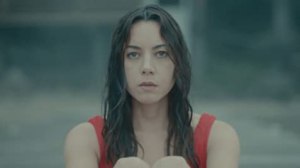 and Gabe are married and own the cabin and Blair is the visiting actress. And they’re no longer alone: they’re actually shooting a movie, which Gabe is directing, surrounded costumes, makeup, camera, script, continuity, ADs and everyone else. And Allison (the actress playing the role) thinks Gabe – the director not the character “Gabe” (played by a bearded lookalike) – is fooling around with Blair, both in the script they’re shooting and off-set. So Allison is guzzling Jack Daniels straight from the bottle, the crew is all
and Gabe are married and own the cabin and Blair is the visiting actress. And they’re no longer alone: they’re actually shooting a movie, which Gabe is directing, surrounded costumes, makeup, camera, script, continuity, ADs and everyone else. And Allison (the actress playing the role) thinks Gabe – the director not the character “Gabe” (played by a bearded lookalike) – is fooling around with Blair, both in the script they’re shooting and off-set. So Allison is guzzling Jack Daniels straight from the bottle, the crew is all 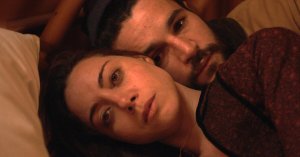 stoned on cannabis, and a big black bear is lurking outside. Can they finish making the movie? Which part is real, the first act or the second act? Or is it all just a meta illusion?
stoned on cannabis, and a big black bear is lurking outside. Can they finish making the movie? Which part is real, the first act or the second act? Or is it all just a meta illusion?
Black Bear is a fascinating study of brain-twisting double-think, as well as a slapstick comedy and living room drama. But does it work? I think it does, and that’s because of the great acting by the three. Aubrey Plaza is the queen of indies, always great, and in this film playing a slinky and sly independent woman almost losing it. Abbott and Gadon are equally good, each playing two very different versions of the same role, almost like an exercise in acting school.
Black Bear is a marvelous intellectual exercise that’s also fun to watch.
Wri/Dir: Jeff Roda
It’s September in the mid-1980s in a small town in New York. A group of 14-year-old friends are gathering outside a club where a big party is supposed to happen that night. But the doorman says no entry until the older teens are there. So they meet around the corner in a vacant lot, to catch up after summer vacation. They don’t have to worry about being out late; all the grownups in town are at a meeting about UFOs. There are two computer nerds, two former best friends, Kira and Missy (Ivy Miller, Taylor Richardson), an introverted artist, and best buddies Shel and Brad. But these friendships are built on strict hierarchies. Shel (Tanner Flood) is self-conscious kid who idolizes Brad (Oliver Gifford) a star soccer player. But a girl has a crush on Shel not Brad. Will they make out? Kira and Missy both hold festering grudges. And one friend is missing from 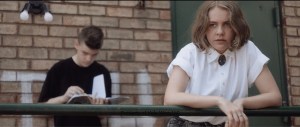 the picture: Lanky (James Freedson-Jackson). Something major happened over the summer, and rumours abound. Is he in prison? Reform school? Or is everything just like it used to be? And hanging over them all is a suicide epidemic, with half a dozen kids at their school dead. There’s bullying, sexual insecurities, internalized anger and alienation. And a gun someone brought that night. Can these fragile friendships last through the evening? And will they actually get into the party?
the picture: Lanky (James Freedson-Jackson). Something major happened over the summer, and rumours abound. Is he in prison? Reform school? Or is everything just like it used to be? And hanging over them all is a suicide epidemic, with half a dozen kids at their school dead. There’s bullying, sexual insecurities, internalized anger and alienation. And a gun someone brought that night. Can these fragile friendships last through the evening? And will they actually get into the party?
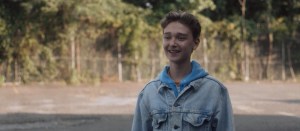 18 to Party is a social drama that draws on movies from the 80s, sort of a combination of The Breakfast Club (but not as commercial and retrogressive) and River’s Edge (but not as creepy). It’s dressed up with the hairstyles, clothes and music from that era, but the story is all it’s own. It’s shot in a very small area, like a play, where people exit and enter and cross the stage, but the camera seldom leaves the brick-wall area. The characters work, because while some of them fit classic stereotypes, they’re all multi layered. And the film deals with prejudices and themes unique to that era. I haven’t seen any of the actors before but they play their parts very well, especially Ivy Miller as the rebel, Tanner Flood as the main character and James Freedson-Jackson as the loose cannon.
18 to Party is a social drama that draws on movies from the 80s, sort of a combination of The Breakfast Club (but not as commercial and retrogressive) and River’s Edge (but not as creepy). It’s dressed up with the hairstyles, clothes and music from that era, but the story is all it’s own. It’s shot in a very small area, like a play, where people exit and enter and cross the stage, but the camera seldom leaves the brick-wall area. The characters work, because while some of them fit classic stereotypes, they’re all multi layered. And the film deals with prejudices and themes unique to that era. I haven’t seen any of the actors before but they play their parts very well, especially Ivy Miller as the rebel, Tanner Flood as the main character and James Freedson-Jackson as the loose cannon.
This film’s worth seeing.
Dir: Sarah Gavron
Rocks (Bukky Bakray) is a young woman who goes to an all-girl London highschool. She’s warm, funny, clever and buoyant, with a close circle of friends. Her bestie Sumaya (Kosar Ali) helps her with her first tampon – they’re that close. She lives with her little brother Emmanuel (D’angelou Osei Kissiedu) and their mom, originally from Lagos, Nigeria. (Their dad died years earlier.) But one day, her mom doesn’t come home from the bakery where she works. Turns out she was fired two weeks earlier. Then Emmanuel notices the food in the fridge has gone bad – the power was cut off. And when, coming home from school, she notices some officials at their door, she realizes it’s time to get out of there.
So she heads out, exploring London while asking her school friends for sleepovers. She brings her brother everywhere, who, in turn, carries a little frog in a terrarium that he got from school. She takes care of Emmanuel he protects his friog. But as her money runs out and stress grows, she’s increasingly alienated from her friends. Will the social workers track her down? Will her mother ever come back? And what  about Emmanuel?
about Emmanuel?
Rocks – which debuted at TIFF last year – is an excellent high school drama told in that super-realistic European style. It’s a different sort of coming-of-age drama, with kids facing much harsher conditions than you usually see in movies. But it’s not depressing. While there are some heavy tear-jerk scenes, its mainly funny, surprising and upbeat. It explores underground contemporary London, like sketchy hoods, makeup artists, pompous school teachers, and a fascinating portrayal of a Somali family. And Bukky Bakray is really, really good as Rocks.
I liked this movie.
Rocks, 18 to Party, and Black Bear are all playing theatrically in select theatres today – check your local listings, or are available digitally or Video on Demand.
This is Daniel Garber at the Movies each Friday morning on CIUT 89.5 FM and on my website culturalmining.com.
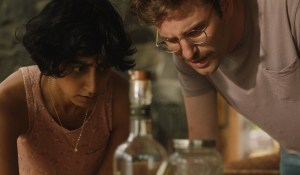
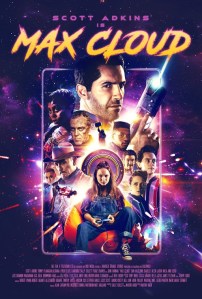

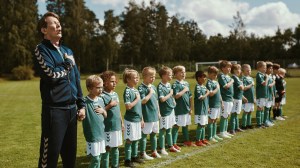
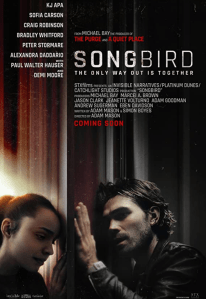
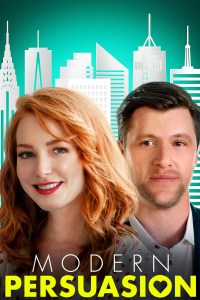

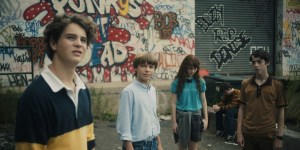
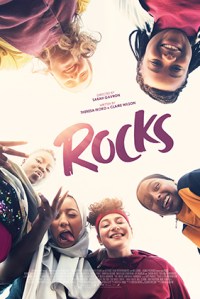
leave a comment